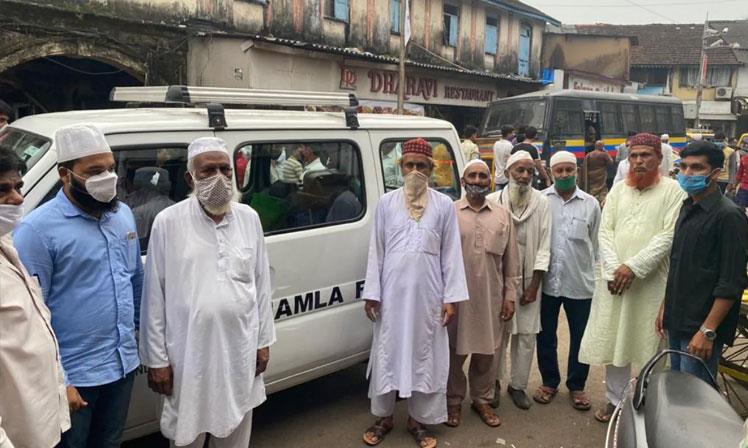
How Muslim Clerics in Mumbai's Dharavi are Leading the Battle Against Coronavirus
7-October-2020
One of Dharavi's biggest challenges in the past few months has been to sensitize the masses about the dangers of COVID-19. While the Brihanmumbai Municipal Corporation (BMC) and the state government have worked tirelessly to spread awareness, they have also relied heavily on community engagement for sensitizing the masses.
"Currently, we are approaching every section of society to spread awareness about the virus. The reason Dharavi has seen a drop in the number of cases is because of community engagement. So we are tapping every resource of the community. Through NGOs we are also reaching out to the front section of the society," said Kiran Dighavkar, Assistant Commissioner of the G North ward, BMC.
"Dharavi is not an enclosed zone, people step out for work from these slums every day and many come here to work as well, especially after we entered the 'unlock' phase. Therefore, there is a possibility of a second wave of infection surfacing in this area and the only way to avert it is to make people aware of the safety measures like mandatory use of face masks, social distancing, use of hand sanitizers, etc," he added.
One such sensitization drive in Dharavi that has received praises from international organisations as well the local governing authorities. It is being organized by an NGO called Bhamla foundation, which has brought together a group of 180 maulvis and maulanas of the area to spread awareness about COVID-19 through religion. The Founder of Bhamla Foundation, Asif Bhamla told News18, "The situation was very chaotic in the initial days of the pandemic since many people refused to follow social distancing norms, and roamed about freely. If our volunteers tried to educate them about the virus, they were dismissed. They would not even allow our volunteers to check their temperatures or oxygen levels."
"Therefore, we thought of bringing the maulvis and maulanas of the area on board, because they are immensely respected among the community members. We thought that if the clerics were to talk about the preventive measures, perhaps it would resonate more with the masses," he added.
In the last 6 months, these Muslim clerics have made door-to-door visits to the houses in the area almost every day, in a bid to sensitize people, and there has been a distinctive behavioral change in how people react to COVID-19, said Bhamla. "We asked senior maulvis, and maulanas to go on door-to-door visits in our vans and educate people. We realized if we explain things to them from a religious perspective, they would reckon that they should take precautions against COVID, and not jeopardizes their own lives, their families� lives as well as the lives of the members of their community, since it is against their religion." said Bhamla.
One of the volunteers of the NGO, Sohail Khan explained, "Our first task was to reach out to the maulanas and maulvis and get them onboard. Since the mosques were closed, we spoke to only three of them. But, once they were convinced, they brought more religious preachers of the area. Slowly, the group began to grow." A big challenge for the team was also to convince the elderly population, who were unwilling to comply with the rules and,more importantly, often refused to go to the quarantine centers when they were unwell.
The maulvis nudged them to go, and so they finally conceded. In centers where many Muslims were kept in quarantine, the NGO also arranged for the azaan to be read, so that the senior citizens did not feel secluded, even though they were away from their families.
Farooquie Sheikh, who heads the Jama Masjid, the biggest mosque of the area, told News18, �Since the early days of lockdown, in every namaz, we explain to people how important it is to take proper precautions against COVID-19. We tell families to keep the kids at home. We keep a track of police guidelines, market timings, and we repeat those announcements so that people are well aware of them, and there isn�t any confusion."
"We also do door-to-door visits to explain the importance of social distancing. Dharavi is extremely populated, so we made it our prerogative to visit every house we can to spread the message," he added. Many maulvis and maulanas also carry photographs of the deceased during their visits so that people can see for themselves the havoc COVID-19 has wreaked on so many families. The maulvis also try to explain how this grave crisis has shut down holy places like Mecca and Medina, so Dharavi residents shouldn�t complain about following precautions. They try to evoke nationalistic sentiments among the locals and tell them to follow precautions for the sake of their own country.
"We are still doing the announcements. Our mosques are still not open. Few come to offer namaaz, as per social distancing norms, and then after the azaan, we don�t allow anyone else to enter. By God�s grace, look at how the numbers in Dharavi have gone down," added Sheikh.
Meraj Husain, the CEO of Bhamla Foundation said, �During this pandemic, three big festivals � Eid, Bakri Eid, and Muharram � also happened. Ramzan is one of the biggest Muslim festivals so the markets are usually full and big celebrations take place in the evening. But this year we were very concerned about public gathering and wanted to curb it as much as possible so that we can avoid the spread of coronavirus. So, we spoke to all the maulanas of the masjids, and they gave extensive guidelines about avoiding the usual festivities -- not stepping out for celebrations or shopping, and instead repeatedly instructed people to celebrate with their loved ones in their homes. And, most people followed those instructions."
Leave a comment: (Your email will not be published)